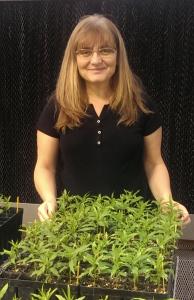Ksenija Gasic
Clemson University
Expert Bio
Dr. Ksenija Gasic is peach breeder and geneticist that revived 25-year dormant peach breeding program at the Clemson University in 2008. Her research is focused on development of high quality, disease resistant peach varieties adapted to environmental conditions of Southeastern US. She is developing early to late-ripening, fresh market types of peaches and nectarines that meet the demands of the consumers and provide the highest return on investment for growers. The emphasis is on combining high quality and consistent productivity with improved resistance to diseases, such as bacterial spot and brown rot, and increased health benefits in new peach varieties. Dr. Gasic’s research involves characterization and utilization of the peach genetic diversity and development and utilization of genomic technology to improve breeding efficiency. Her program has been actively involved in development and application of modern technological tools in breeding programs (www.rosbreed.org; www.rosaceae.org). Dr. Gasic has been representative of South Carolina in the Plant Breeding Coordinating Committee (SCC80) since 2009. She is Vice-chair of the U.S. Rosaceae Genomics, Genetics and Breeding Executive Committee and is actively involved in the Prunus Crop Germplasm Committee. Interest in germplasm preservation and utilization in breeding programs, application of newly developed technologies to improve the efficiency and efficacy of plant breeding programs and education of future generations of plant breeders as well as promoting the importance of plant breeding is the driving force behind Dr. Gasic’s involvement in the SCC80: Sustaining the Future of Plant Breeding.
Studies, Articles and Answers
Showing 2 out of 2 results
Question
Q: are there any gm peach trees?
A: First let us get one thing straight – there are no genetically engineered/modified (GMO) peaches of commercial value. Although some scientific reports of successful peach transformation have been published and web searches produce claims from some private companies that they are capable of producing transformed peaches, reliable and reproducible transformation and regeneration system from peach somatic tissue has yet to be developed. Traditional breeding takes a long time and may never achieve the combination of traits that are desired by consumers. So biotechnology is viewe [...]
LabelingQuestion
A: That is a good question and the simple answer is yes. Under genetic modification in the broad sense, this would fall within random genetic modifications caused by applying radiation. Genetic modifications using Agrobacterium and or CRISPR/Cas 9 system are targeting single or a few genes, so rather “rectifying genetic susceptibilities” due to narrow genomes then by general increase in diversity. General increase in genetic diversity is done much more effectively by crossing with exotic or wild relatives of the agriculturally important species in so called pre-breeding activities, e [...]
Modern Agriculture